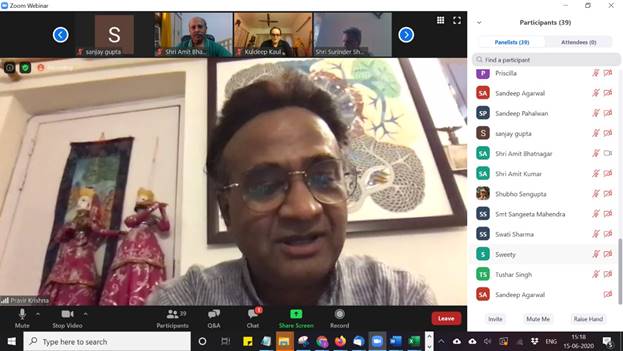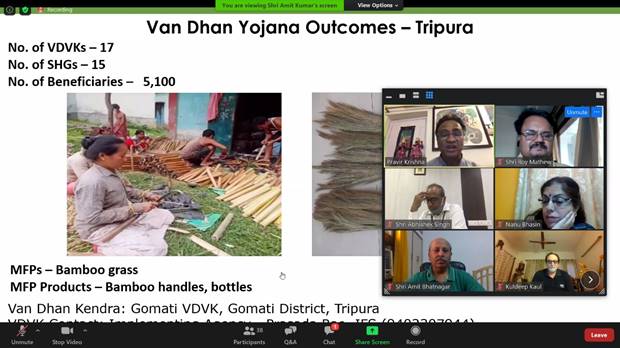Ministry of Tribal Affairs
Coverage of PM Van Dhan Yojana proposed to be expanded from the current 18,000 SHGS to 50,000 Van Dhan SHGS, coverage of tribal gathers to be increased Three fold to 10 lakh
प्रविष्टि तिथि:
15 JUN 2020 9:14PM by PIB Delhi
Tackling an unprecedented crisis of the nature and combating the challenges thrown by the Covid-19 Pandemic require different and innovative approaches. One segment that has been severely impacted during the ongoing crisis has been the tribal population. In such a scenario, the Van Dhan Start-ups, established under the scheme initiated by TRIFED, Ministry of Tribal Affairs has emerged as a source of employment generation for tribal gatherers and forest dwellers and also the home-bound labour and artisans.
A media briefing through Webinar was organised by TRIFED today to familiarise them with this innovative approach and the progress made by the Van Dhan start-ups so that they can further spread awareness among people. The webinar titled “Van Dhan: Tribal Start-ups Bloom in India” was chaired by Shri Pravir Krishna, Managing Director, TRIFED and was attended by over 40 participants. Ms. Nanu Bhasin, ADG, PIB and Shri Abhishek Singh, CEO, MyGov were among those who attended the webinar. The TRIFED team was represented by all the heads of departments and senior officials.
Shri Pravir Krishna began his welcome address with a quick introduction of the Van Dhan Yojana and provided a snapshot of what it intends to achieve and how the scheme has been faring in these current times. He informed that 1205 Tribal Enterprises have been established to provide employment opportunities to 3.6 lakh tribal gatherers and 18000 Self-help groups in 22 States. The slogan “Go Vocal for Local”, a Mantra in these troubled times, has been adapted to include ‘Go Vocal for Local Go Tribal – Mera Van Mera Dhan Mera Udyam’.The aim of the Start-ups scheme is to treble the coverage to 10 lakh tribal gatherers through the Covid-19 relief plan of the Ministry of Tribal Affairs under article 275(I).A State wise snapshot was also presented to show how the states are faring. Started in 2019, the Start-ups spread rather quickly to all the 22 states, almost became a competition once the states realised the value added by this initiative.
Post this snapshot, Shri Krishna presented some real-life examples from states like Nagaland and Rajasthan to underline the critical significance of this programme for tribal livelihoods, which ensures that the proceeds from the sales of these value-added products go to the tribals directly. The value-added products benefit largely from the packaging and marketing that these tribal enterprises provide. Testimonials from different parts of the country, along with contact details of the Van Dhan Vikas Kendras and the products that are being sold were showcased. He mentioned that 2000 products have been identified throughout the country. A bird’s eye view was provided to the participants and samples such as wild honey, broomsticks, donna pattal, Samidha sticks, coffee, bay leaf, bel pulp were displayed. The tribal affairs offers a ray of hope for home-bound tribal labour and artisans through van dhan start-ups.
He reiterated that the uniqueness of the whole exercise is that it has managed to create market linkages and to transform tribal gatherers into entrepreneurs. Many of these tribal enterprises are connected to markets and have received many orders already. As an example, the efforts of the start-ups in Manipur which have turned out to be a model enterprise for the rest of the country, in terms of the packaging, innovations, and training. He recounted the entire success story in Manipur and hailed it as a Champion State and as an example of how this tribal enterprise scheme can benefit the tribals extensively, with the right push and support!
In Manipur, 77 Van Dhan Kendras have been established in the State for value addition and processing of forest produces. The Van Dhan Kendras have reported sales of MFP products worth Rs. 49.1 lakhs since September 2019! What stood out in the case of Manipur is the exemplary food safety and hygiene standards adopted by these 77 centres that have been established, the superb attractive packaging of the processed products such as Amla juice, tamarind amla candy and plum jams, and the innovative branding and marketing of these products. A mobile van service has also been started in one of the districts to ensure the selling of these products!
 .
.
After showcasing the successes and noteworthy examples, he spoke briefly about the immediate next steps regarding the Van Dhan Start-up programme. The first next step is to expand the current coverage of 18,000 SHGs to 50,000 Van Dhan SHGs and to treble the coverage to 10 lakh tribal gatherers through the Covid19 relief plan of the Ministry of Tribal Affairs under article 275(I). The ultimate aim is to transform the tribal ecosystem across the country by establishing Van Dhan Yojana as the next “Amul revolution” in terms of MFPs. Convergences and partnerships are being planned with other ministries and departments and key institutions to take this cause ahead.
The MD, TRIFED explained that the VDVKs have so much potential that they easily offer a ray of hope for home-bound tribal labour and artisans who might face livelihood issues on their return.
A major initiative which will show the way forward is the planned migration to complete the digital platforms including for procurement. ATRIFED website (https://trifed.tribal.gov.in/) was commissioned today for a trial run till 30 June (before the formal launch by the Union Minister for Tribal Affairs) and a procurement platform which will be launched by 30 July 2020. All details, statistics and real-time information of the Van Dhan Yojana across the country can be viewed at https://trifed.tribal.gov.in/vdvk/auth/login.php. A peek look into the website and the mobile app was provided.

Shri Krishna explained that Rs.15 lakhs from the central government has been provided to each of these centres. So far 25% -30% of this grant has been spent by the VDVKs on activities such as purchase of raw materials, labour costs etc. An amount has been set aside for each of these kendras and how they use the money and on what is for them to decide. In the case of Nagaland, approximately 3.5 crores worth of sales have been done. Once all the other states pick up steam with respect to this scheme, 1 crores sales per state in a few months would be possible.
Post the question-answer session, Shri Krishna announced the next webinar (in this series of webinars that will give a ringside view into the lives of the tribal communities and the initiatives being undertaken to help ease their plight) on “MSP for MFP TAKES Roots in Tribal India” planned with the media fraternity on 18th June, 2020.
*****
NB/SK/MoTA/15.06.2020
(रिलीज़ आईडी: 1631790)
आगंतुक पटल : 3589